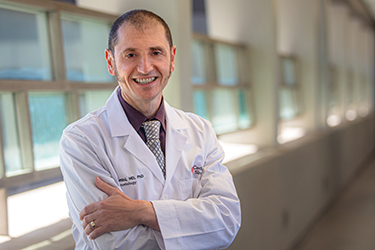Catalyst
Far-Reaching Impact on Autoimmune Disease
Jun 04, 2024 Cedars-Sinai Staff

At the ribbon-cutting ceremony for the Kao Autoimmunity Institute (L-R); Eliz Lee; Eric Kau; Nunzio Bottini, MD, PhD; Francesco Boin, MD; Jen Kao; Adam Leibsohn; Yu-Fan Kao; Thomas M. Priselac, president and CEO, Cedars-Sinai; Min Kao; James Lippman, (former) chair, Cedars-Sinai Board of Directors; Shlomo Melmed, MB, ChB, executive vice president for Medicine and Health Sciences and dean of the medical faculty, Cedars-Sinai; Paul Noble, MD, chair, Department of Medicine, Cedars-Sinai; Heather R. Vučetin , vice president, Development, Cedars-Sinai

Nunzio Bottini, MD, PhD, inaugural director of the Kao Autoimmunity Institute
Fueled by a landmark $20 million gift from the Kao Family Foundation, Cedars-Sinai established the Kao Autoimmunity Institute, deepening its commitment to translational and clinical research to advance the treatment of rheumatic illnesses. This past fall, members of the Kao family were on hand for a ribbon-cutting ceremony marking the completion of the first phase of construction of the institute’s clinical space.
With their donation, the Kaos are channeling their philanthropy into far-reaching impact. Led by the insights, experiences and vision of their daughter, Jen Kao—who has scleroderma and is a patient at the institute—the family is helping Cedars-Sinai build a center of excellence on the West Coast that provides comprehensive, compassionate and personalized care for all patients with autoimmune diseases.
Additionally, the Kao Autoimmunity Institute is pioneering discovery in the field and playing a leading role in related outreach, training and education. Housed within the institute is the Kao Multispecialty Scleroderma Program, which is transforming our understanding of this autoimmune connective tissue disease. Scleroderma can cause debilitating inflammation in the skin and life-threatening complications in the lungs, heart, GI tract and other vital organs.

Francesco Boin, MD, director of the Kao Multispecialty Scleroderma Program
Since receiving the gift, Cedars-Sinai has recruited renowned faculty working at the forefront of autoimmune disease research and clinical care. Nunzio Bottini, MD, PhD, is the institute’s inaugural director. His cutting-edge investigations into rheumatoid arthritis and scleroderma have been continuously funded by the National Institutes of Health (NIH) since 2006. Francesco Boin, MD, joined the medical center as director of the Kao Multispecialty Scleroderma Program, and he also holds the Cedars-Sinai Chair in Rheumatology.
According to the NIH, an estimated 24 million people in the U.S. are diagnosed with autoimmune diseases—among them scleroderma, rheumatoid arthritis, lupus, multiple sclerosis, inflammatory bowel disease and Type 1 diabetes.


